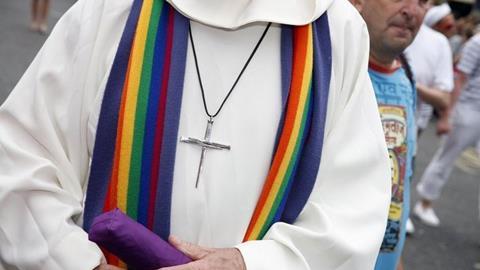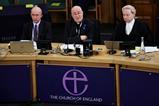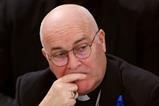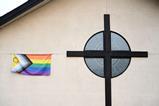The proposed Prayers of Love and Faith, offering blessings for LGBT couples, go before General Synod this week. But Rev Dr Christopher Landau says fundamental questions remain unanswered. He’s making a plea for theological coherence

As recently as December 2019, the bishops of the Church of England offered a clear and concise summary of the Church’s teaching about sex. For those who despair at the CofE never having a clear view on anything, it was somewhat surprising.
In response to the government’s decision to allow opposite sex couples to enter into civil partnerships for the first time, the House of Bishops formally stated: “The Church’s teaching on sexual ethics remains unchanged. For Christians, marriage – that is the lifelong union between a man and a woman, contracted with the making of vows – remains the proper context for sexual activity. In its approach to civil partnerships the Church seeks to uphold that standard, to affirm the value of committed, sexually abstinent friendships and to minister sensitively and pastorally to those Christians who conscientiously decide to order their lives differently.”
Contrast these observations with those of Most Rev Stephen Cottrell, Archbishop of York, speaking on BBC Radio 4’s Sunday in January this year: “What we are saying is that physical and sexual intimacy belongs in committed, stable, faithful relationships and, therefore, where we see a committed, stable, faithful relationship between two people of the same sex, we are now in a position where those people can be welcomed fully into the life of the Church, on their terms.”
If the Church is to make a change to its teaching about sex, it must do so with clarity
Then, just last month, Most Rev Justin Welby, Archbishop of Canterbury, said something similar at the Religion and Media Festival in response to a searching question from a 22-year-old woman, who asked whether the Church was “too apologetic about its positions on sexual morality”.
Welby responded: “I think we do need to be more open about the basic rules, the basic understanding of sexual morality within Christian thinking. Without sounding as though we are lecturing, but just to be unapologetic about saying… sexual activity should be within permanent, stable and faithful relationships of marriage as that is understood in each society” (my emphasis).
A significant shift
Like Cottrell, the Archbishop of Canterbury seemed to be signalling a significant liberalisation of the CofE’s current sexual ethic. And this lays a fascinating foundation for the Synod’s ongoing deliberations about the Prayers of Love and Faith. What seems clear is that both archbishops view the prayers as heralding a new moment in the Church’s understanding about the appropriate place for sexual intimacy.
Why, then, are the prayers themselves silent about such intimacy, in stark contrast to the Common Worship marriage service, which speaks of “the delight and tenderness of sexual union”?
The answer lies in the Church’s commitment, even as it debates the introduction of the Prayers of Love and Faith, not to undermine its existing doctrine of marriage (or “Holy Matrimony”, as the official documents describe it).
A briefing from the CofE’s legal office states: “The draft prayers contain no implication that what is being celebrated or blessed is a sexual relationship. The argument that the prayers are therefore indicative of a departure from doctrine so far as sexual relationships are concerned cannot be sustained; they are simply silent on that point.”
But while the prayers are silent about sexual activity, the archbishops are not.
Silent on sex
And silence is being challenged in various ways in today’s Church of England. The controversy around safeguarding is just one terrible example of where toxic silence is proving untenable.
In relation to the Living in Love and Faith process, the “pastoral principles” for facing difference include an exhortation to “speak into silence”. This is accompanied by the question: “Can it be right for our church communities to promote a conspiracy of silence – whether consciously or subconsciously – about matters relating to sexuality and gender?”.
But even if the new prayers are silent on sex, existing liturgy – which provides part of the formal bedrock for Anglican faith – is unambiguously clear, and this also provides a problem for the archbishops.
In the Book of Common Prayer (BCP), the second stated purpose of marriage (after procreation) is as “a remedy against sin, and to avoid fornication.” This may be more detail than you need, but fornication - in the pages of the BCP, and thus part of the formal teaching of the Church - is any sexual activity outside of male-female marriage. In its Litany, it is a sin from which people pray to be delivered.
Not all Anglican churches choose to use such liturgies, but traditional sexual ethics are followed with deep sincerity in many local parishes. Such Christians are, apparently, on the verge of seeing their own sexual sacrifices move from being an expression of fidelity to Church teaching, to a tolerated exception in a liberalised Church culture.
Whatever your view of the change, it is a significant shift.
Clarity in the Church
My purpose in writing this is not to make a case for one side or another in this protracted and often painful debate. Nor is it to downplay the ways in which LGBT people have experienced shameful harm rather than welcome from the Church.
But I do wish to make a plea for theological coherence. If the Church is to make a considerable change to its teaching about sex, it must do so with clarity for those on all sides, rather than tactical silence and Anglican fudge.
The briefing paper issued ahead of this week’s Synod infers that the preferred option for the adoption of the Prayers of Love and Faith is a highly unusual one: approval simply given by the two archbishops on the basis, as Canon B4.2 of the Church’s law puts it, that what they propose is “neither contrary to, nor indicative of any departure from, the doctrine of the Church of England in any essential matter”.
The trouble is, even many of those who support the introduction of the prayers concede that they are both controversial and innovative.
If the Church does wish to introduce forms of service that signify a departure from existing doctrine, there is a procedure for doing so. Canon B2 would require debate by the General Synod, and approval (with a two-thirds majority) in each of the three houses – bishops, clergy, and lay people. In other words, it would need a substantial majority from each of the different groups within the CofE.
While the prayers are silent about sexual activity, the Archbishops are not
In response to a later question at the Religion Media Festival, the Archbishop of Canterbury underlined that he is not the Pope, and has few levers he can pull in Church governance. But some worry that, in this case, a major change to Church teaching is being pushed through via an unusual route - rooted in archiepiscopal power - that circumvents open debate.
It would be a deep irony if, just at the moment when wider society might be ready to give the Church’s counter-cultural views on sex and sexuality a second hearing, the Church itself failed to give proper scrutiny to a major change in its own direction.
It has apologised to LGBT people for past failings, and there clearly needs to be evidence of the warmer welcome the Synod has endorsed towards these communities. But if the CofE is to avoid a major split over the implementation of the Prayers of Love and Faith, their significance in changing the Church’s doctrine of marriage and sexuality has to be faced and, surely, debated in full.





































No comments yet